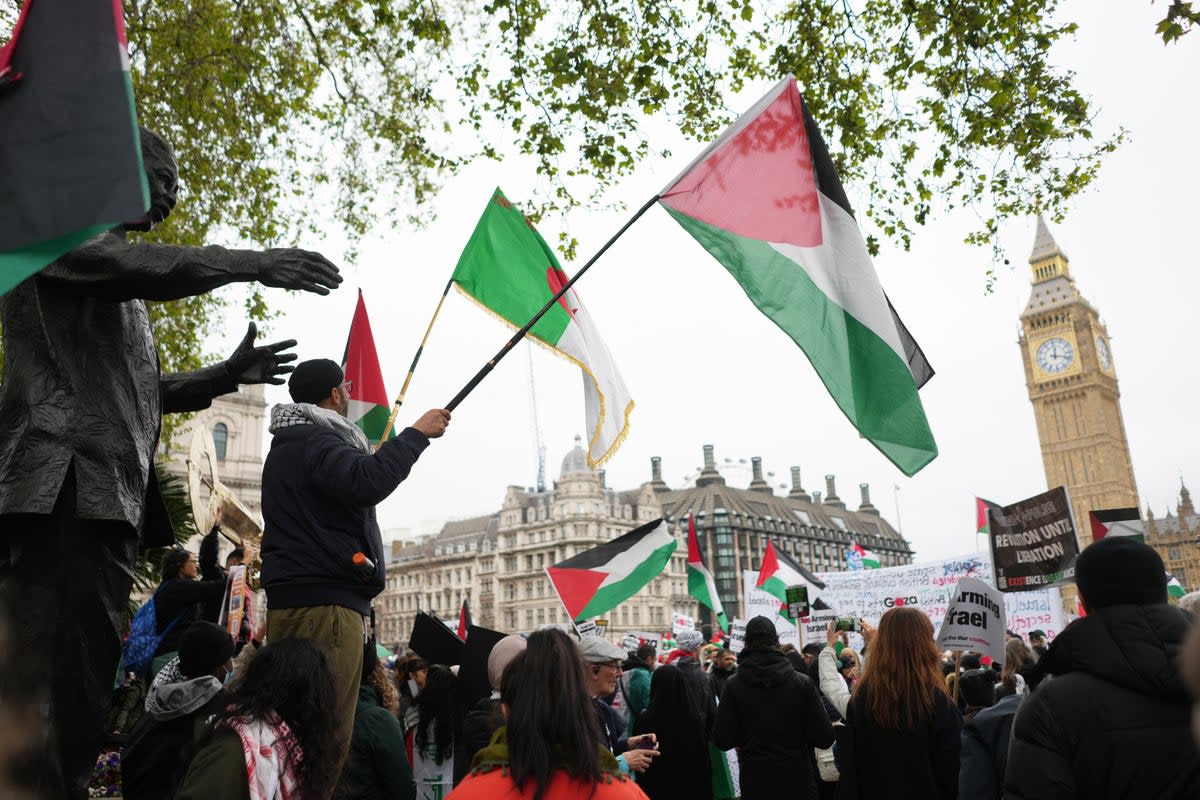Michael Gove flirts with the toxic fantasies of the hard right at his peril

Among his other responsibilities, Michael Gove is secretary of state for “communities” – an amorphous term he has imbued with an unfamiliar muscularity in recent times. There is no one presently in government, including the prime minister himself, who has done more to preserve, protect and defend the Jewish community than Mr Gove. His instincts in this respect are laudable.
There can be no doubt that, for some people of Jewish heritage, the regular marches in central London against the war in Gaza, and the campus protests that have sprung up in British universities, can be intimidatory and distressing – both if experienced in person or via media coverage. It can feel, and is, in some cases, antisemitic.
As Mr Gove put it, in a keynote speech at a north London community centre, it can be a mark of a society turning to “darkness” and in on itself. It awakens fears that have lain mostly dormant since the Holocaust. The context is vividly, chillingly delineated – an “iron-clad law of history that countries which are descending into darkness are those which are becoming progressively more unsafe for Jewish individuals and the Jewish community: the Spain of the Inquisition, the Vienna of the 1900s, Germany in the Thirties, Russia in the last decade.”
In short, if Jewish people in Britain today feel fearful, then those fears must be allayed and acted upon. If they say they are frightened, that should be good enough for everyone – though it is also fair to add that some Jewish people attend the rallies and some Jewish students are involved in the university disruption.
But Mr Gove draws some erroneous and damaging conclusions from the recent rise in antisemitism among sections of the hard left, the far right and radical Islamists, which is evidenced most readily and disgustingly on social media. It is there that the hate is displayed in all its Nazi crudity, and not so much in academic environments or on marches vaguely devoted to peace.
Mr Gove suggests that what his former colleague Suella Braverman idiotically termed “hate marches” should be restricted, if not banned. Mr Gove regards them, or elements of them, as part of a “campaign of hate” against Jews, which is problematic in two respects. First, many of the marchers, at least, have no ill will towards any Jews, anywhere, but merely want the unnecessary killing of civilians in Gaza to end. Most immediately, they do not want Mr Netanyahu to invade Rafah, for obvious reasons.
Neither do Lord Cameron, President Macron, President Biden, the judges on the International Court of Justice and some former premiers and other prominent figures in Israel itself – but no one accuses them of antisemitism or campaigning against “Zionists”, because they aren’t, either. Nor is Benny Gantz, the de facto deputy premier in Mr Netanyahu’s war cabinet, who despairs at his boss’s lack of vision for a peaceful future in the region.
Mr Gove should be gently confronted with a brutal, inconvenient truth – which is that no one is doing more to further the “delegitimisation and demonisation of the state of Israel” than Mr Netanyahu himself.
The slogan “From the river to the sea, Palestine will be free” may be seen or heard on marches and sit-ins, though less frequently nowadays. Yet, while alarming and murderously meant by some, for others it is a less well-considered, well-meaning plea for peace between the Palestinians and the Israelis. They may be naive but they are not antisemites. Mr Gove argues that they seek “the erasure of the Jewish people’s home; Bethlehem, Nazareth and Jerusalem to become Judenfrei”. Some, perhaps – but it is disingenuous for Mr Gove to imply they all are. All most want is a ceasefire and to avoid a famine.
Even if Mr Gove were right, the practicalities and legalities of attempting to restrain the right to protest and to muzzle free speech are formidable. The new law in protest, framed by Ms Braverman, that gives extra powers to the police to limit the degree of “disturbance” demonstrators can inflict on the rest of the population, has already fallen foul of the High Court; and, as countless riots have proven in the past, in the end, any attempt to stop protest inevitably leads to worse disorder and violence. Making march organisers personally responsible for everything that is said and done by tens of thousands of people at any event is absurd, and counterproductive if it creates free-speech “martyrs”.
The police cannot easily dive into a gathering to pick out a potential law-breaker at a march against the war any more than they can at a football match. Apprehending offenders spouting hate at any venue is an operational matter best left to officers on the ground. We cannot have cabinet ministers telling police chiefs who to arrest; nor to order judges to find them guilty, send them to jail and throw away the key. That would certainly constitute a retreat into darkness. Such are the toxic fantasies of the hard right, and Mr Gove flirts with them at his peril.
Unlike many others, though, Mr Gove does redeem himself with a gesture towards another trend that threatens to shove society towards darkness – that of vicious Islamophobia. Though he won’t use that widely accepted term, Mr Gove wants to recruit an independent adviser on anti-Muslim hatred, in parallel with the existing independent adviser on antisemitism.
Next step? One would hope to hear a lengthy and thoughtful speech addressing the fears of Britain’s Muslim citizens. They, too, would like to be told that “your safety is the best guarantee of our security, your freedom to live as you choose the only way we can be certain we remain a land of liberty – your future is our future”.


